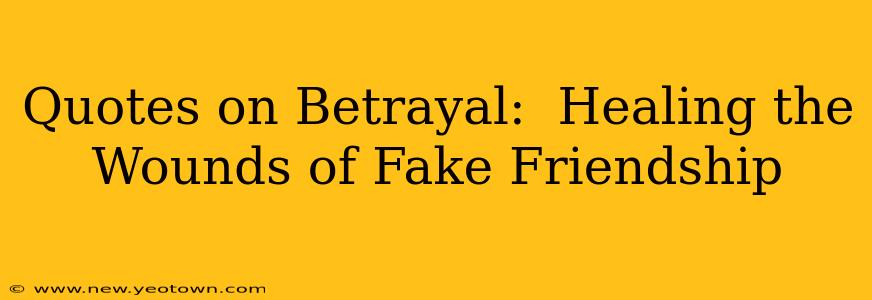Betrayal by a friend—a supposed confidante—cuts deep. It shatters trust, leaving behind a landscape of hurt, confusion, and anger. While finding the right words to articulate the pain is challenging, powerful quotes on betrayal can offer solace, validation, and a pathway towards healing. This exploration delves into the emotional impact of fake friendships and betrayal, offering insights into the recovery process, along with relevant quotes that resonate with the experience.
What is a Fake Friendship?
Before diving into the pain of betrayal, let's define what constitutes a fake friendship. A fake friendship often involves superficial interactions, a lack of genuine empathy, and an underlying self-serving motive. These relationships may seem supportive initially, but eventually reveal themselves as transactional, lacking the mutual respect and emotional vulnerability true friendships possess. Recognizing the signs is crucial to protect yourself from further hurt. Signs often include inconsistent behavior, a lack of genuine interest in your life, and a tendency to use you for personal gain.
The Sting of Betrayal: Why it Hurts So Much
Betrayal in friendship is profoundly painful because it violates the fundamental principles of trust and loyalty that underpin any close relationship. We invest emotionally, sharing our vulnerabilities and secrets, expecting reciprocal honesty and support. When that trust is broken, it creates a sense of violation and insecurity, leaving us questioning our judgment and self-worth. The pain is often intensified by the perceived hypocrisy, as the betrayal comes from someone who claimed to be a friend.
Quotes That Capture the Essence of Betrayal
Many insightful quotes eloquently capture the complexities of betrayal and the emotional aftermath:
- "The most painful thing is losing yourself in the process of loving someone too much, and forgetting that you are special too." – Unknown This quote speaks to the self-neglect that can accompany deeply invested friendships, highlighting the importance of self-worth in healing.
- "The best revenge is massive success." – Frank Sinatra This quote offers a path to empowerment, suggesting that focusing on personal growth and achievement can be a powerful antidote to the sting of betrayal.
- "What hurts the most is being cheated on by someone you thought you could trust." – Unknown This simple yet profound quote perfectly encapsulates the core pain of betrayal, emphasizing the violation of trust.
- "Sometimes people are beautiful. Not in looks. Not in what they say, but in what they do, the way they treat you." – Unknown This quote highlights the importance of actions over words, reminding us to focus on behavior as an indicator of true friendship.
How to Heal from the Wounds of Fake Friendship
Healing from betrayal takes time and conscious effort. It involves acknowledging the pain, processing your emotions, and gradually rebuilding your sense of self and trust. Here are some steps to guide you on your healing journey:
1. Acknowledge and Accept Your Feelings:
Don't suppress your emotions. Allow yourself to feel the hurt, anger, and confusion. Journaling, talking to a trusted friend or therapist, or engaging in creative expression can be helpful ways to process these feelings.
2. Establish Healthy Boundaries:
Setting boundaries is crucial to protect yourself from future manipulation or exploitation. This includes limiting contact with the person who betrayed you and choosing to surround yourself with supportive and trustworthy individuals.
3. Focus on Self-Care:
Prioritize your physical and emotional well-being. Engage in activities that bring you joy, such as exercise, spending time in nature, or pursuing hobbies. Nourishing your body and mind will strengthen your resilience and aid in healing.
4. Forgive (Yourself and Them):
Forgiveness is not about condoning the betrayal; it’s about releasing the anger and resentment that are holding you back. Forgiveness, whether extended to yourself or the other person, frees you to move forward and build healthier relationships.
5. Learn from the Experience:
Betrayal can be a painful teacher, offering valuable lessons about recognizing red flags and establishing healthy relationship boundaries. Reflect on the situation to identify patterns and improve your ability to choose trustworthy friends in the future.
Frequently Asked Questions
How do I know if a friendship is fake?
Signs of a fake friendship often include superficial interactions, a lack of genuine empathy, inconsistent behavior, a lack of interest in your life, and a tendency to use you for personal gain.
What are the long-term effects of betrayal in friendship?
Long-term effects can include difficulty trusting others, anxiety, depression, and a reluctance to form new close relationships. Therapy can be beneficial in addressing these issues.
How long does it take to heal from betrayal?
Healing from betrayal is a personal journey with no set timeline. It depends on the severity of the betrayal, your coping mechanisms, and the support you receive.
Is it possible to forgive someone who has betrayed you?
Yes, forgiveness is possible, but it’s a process that requires time and effort. It’s not about condoning the behavior but about releasing the anger and resentment that hold you back.
By understanding the dynamics of betrayal, embracing self-compassion, and actively working towards healing, you can navigate this challenging experience and emerge stronger and more resilient. Remember that you deserve genuine, supportive friendships, and your journey towards finding them begins with healing the wounds of the past.

